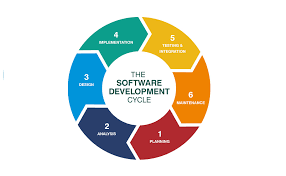Software for Developers: Empowering Innovation and Efficiency
Developers are the architects of the digital world, creating the applications, websites, and systems that power our modern lives. To excel in their craft, developers rely on a wide array of software tools that enhance their productivity, streamline workflows, and empower innovation. In this article, we will explore some essential software for developers that are revolutionizing the industry.
Integrated Development Environments (IDEs) form the backbone of any developer’s toolkit. These powerful software solutions provide a comprehensive environment for coding, debugging, and testing applications. IDEs like Visual Studio Code, Eclipse, and JetBrains IntelliJ IDEA offer advanced features such as code autocompletion, syntax highlighting, version control integration, and seamless collaboration capabilities. With these tools at their disposal, developers can write code more efficiently and effectively.
Version control systems are another critical component of a developer’s arsenal. Git has emerged as the de facto standard for managing source code repositories. Git allows developers to track changes to their codebase over time, collaborate with team members seamlessly, and easily roll back to previous versions if needed. Platforms like GitHub and Bitbucket provide hosting services for Git repositories along with additional features like issue tracking and project management tools.
For web development projects, frameworks play a crucial role in speeding up development time while ensuring scalability and maintainability. Frameworks such as React.js for front-end development or Node.js for back-end development provide pre-built components and libraries that simplify common tasks. These frameworks enable developers to focus on building unique features rather than reinventing the wheel.
Database management systems are fundamental to storing and retrieving data efficiently. MySQL, PostgreSQL, MongoDB are popular choices among developers due to their robustness and flexibility. These systems offer various features like data replication for high availability or NoSQL capabilities for handling unstructured data. With efficient database management software in place, developers can ensure reliable data storage while optimizing performance.
In recent years, containerization technologies like Docker and Kubernetes have gained immense popularity. These tools allow developers to package applications and their dependencies into lightweight, isolated containers. Containers provide a consistent environment across different platforms, making it easier to deploy applications reliably and scale them as needed. By leveraging containerization software, developers can ensure consistent performance regardless of the underlying infrastructure.
In the era of cloud computing, cloud service providers like Amazon Web Services (AWS), Microsoft Azure, and Google Cloud Platform offer a wide range of services tailored specifically for developers. These platforms provide scalable infrastructure, serverless computing capabilities, managed databases, and AI/ML services. Developers can leverage these cloud-based solutions to build robust applications that scale effortlessly and take advantage of cutting-edge technologies.
In conclusion, software tools for developers have revolutionized the way we build digital solutions. From powerful IDEs to version control systems, frameworks to database management systems, containerization technologies to cloud platforms – these software solutions empower developers to create innovative applications efficiently. By staying up-to-date with the latest advancements in developer software, professionals in this field can continue pushing the boundaries of what is possible in the digital realm.
Six Essential Software Development Practices for Enhanced Collaboration, Code Quality, and Efficiency
- Use version control systems like Git to track changes in your code and collaborate with other developers.
- Write clean and modular code to improve readability and maintainability.
- Document your code using comments and clear naming conventions to make it easier for others (including future you) to understand.
- Automate repetitive tasks with build tools or scripts to save time and reduce errors.
- Regularly update your software dependencies to ensure security patches and bug fixes are applied.
- Test your code thoroughly using unit tests, integration tests, and end-to-end tests to catch bugs early.
Use version control systems like Git to track changes in your code and collaborate with other developers.
Version control systems like Git are invaluable tools for developers. By utilizing Git, you can effortlessly track changes in your code, ensuring a comprehensive history of modifications and making it easier to identify and fix issues. Moreover, Git facilitates seamless collaboration with other developers, allowing multiple team members to work on the same codebase simultaneously. Through features like branching and merging, Git enables efficient collaboration while minimizing conflicts. Embracing version control systems like Git enhances productivity and promotes effective teamwork in software development projects.
Write clean and modular code to improve readability and maintainability.
One essential tip for developers is to write clean and modular code to improve readability and maintainability. Clean code follows best practices, adheres to coding standards, and is easy to understand. By writing clean code, developers can enhance collaboration within their teams and make it easier for others to understand and maintain their work. Modular code breaks down complex tasks into smaller, reusable components, making it more manageable and adaptable. This approach not only improves the readability of the code but also simplifies debugging and future enhancements. Ultimately, prioritizing clean and modular code leads to more efficient development processes and ensures that software remains maintainable in the long run.
Document your code using comments and clear naming conventions to make it easier for others (including future you) to understand.
Documenting code using comments and employing clear naming conventions is an invaluable tip for developers. By providing explanatory comments throughout the code, developers can ensure that others, including their future selves, can easily understand the purpose and functionality of each section. Additionally, using descriptive and consistent naming conventions for variables, functions, and classes enhances code readability and maintainability. This practice not only facilitates collaboration among team members but also enables efficient troubleshooting and debugging in the future. Investing time in thorough documentation and clear naming conventions ultimately leads to more robust and comprehensible codebases.
Automate repetitive tasks with build tools or scripts to save time and reduce errors.
One valuable tip for developers is to automate repetitive tasks using build tools or scripts, which not only saves precious time but also minimizes the chances of errors. By automating tasks like compiling code, running tests, and deploying applications, developers can streamline their workflow and focus on more critical aspects of their projects. Build tools such as Gradle, Maven, or Gulp, along with scripting languages like Python or Bash, provide the necessary tools to create custom automation workflows. With automation in place, developers can increase productivity and ensure consistency throughout their development process.
Regularly update your software dependencies to ensure security patches and bug fixes are applied.
Regularly updating your software dependencies is a vital practice for developers. By staying on top of updates, you ensure that your applications are equipped with the latest security patches and bug fixes. Software vulnerabilities can be exploited by malicious actors, potentially compromising the integrity and security of your code. By regularly updating your dependencies, you minimize the risk of security breaches and ensure that your software remains robust and reliable. Additionally, staying up-to-date with updates often brings performance enhancements and new features, allowing you to leverage the full potential of your development tools. Prioritizing regular software updates is an essential step in maintaining a secure and efficient development environment.
Test your code thoroughly using unit tests, integration tests, and end-to-end tests to catch bugs early.
Thoroughly testing code is an essential practice for developers, as it helps catch bugs early in the development cycle. By utilizing a combination of unit tests, integration tests, and end-to-end tests, developers can ensure that their code functions as intended and meets the desired specifications. Unit tests focus on testing individual components or functions to verify their correctness. Integration tests validate the interaction between different components to ensure they work together seamlessly. Finally, end-to-end tests simulate real-world scenarios to test the entire system’s functionality. By incorporating these testing methodologies into their workflow, developers can identify and fix issues before they manifest in production, leading to more robust and reliable software solutions.




